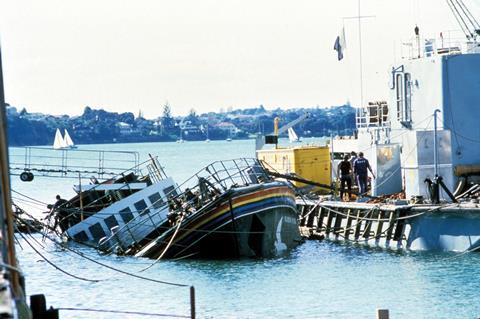Seasoned climate litigator Kate Harrison has acted for Greenpeace for more than 20 years. But a good day in court only goes so far, she tells Eduardo Reyes – even now the policy arguments still need to be won
The 1985 sinking of the Rainbow Warrior, flagship of the Greenpeace fleet, by French intelligence officers was a defining event in the environmental conflicts of the 1980s. The Rainbow, moored at Auckland, was a veteran vessel of the campaigning group’s direct action attempts to disrupt and record both nuclear testing programmes and whaling. The agents set two bombs, one allegedly to disable the ship and the second intended to sink it. A Greenpeace photographer drowned; a French defence minister resigned; and secret agents went to prison for manslaughter.
I recall the event because there is a perception that the established environmental campaigning groups such as Greenpeace and Friends of the Earth have become, well, more ‘establishment’. The headlines are regularly grabbed by more recent arrivals – Extinction Rebellion and Just Stop Oil. The simple message of the latter groups is that, faced with a climate emergency, we do not have time for due process and insider lobbying at international conferences. Something closer to revolution is needed.
That could be taken to include a lack of patience with the courts and legal routes of redress. Matthew Gingell, a company general counsel and founder of climate change not-for-profit The Chancery Lane Project, is not associated with those groups but expressed a sense of frustration at a Gazette roundtable last year.
‘It took 782 days to bring the Friends of the Earth versus Shell case through the Dutch courts, and that’s now in appeal,’ Gingell pointed out. ‘And it took 685 days to enact the Environment Bill, so laws and climate litigation aren’t exactly going fast.’

Days in court
Greenpeace remains heavily committed to direct action and protest. An aspiring activist will find the roles they could play neatly laid out on the Greenpeace website, each with a risk rating. Notwithstanding the fate of the Rainbow, ‘boat crew’ is now deemed ‘medium risk’; ‘climber’, ‘blocker’ and ‘lock-on’ are ‘high risk’.
Greenpeace is not in the water the week I speak to Kate Harrison, partner at Harrison Grant Solicitors, but the campaign group is in the High Court seeking judicial review of the government’s decision to launch a new licensing oil and gas round. (Harrison founded the firm in London with Stephanie Grant in 2004 to provide public law, environment and human rights advice to campaigning groups and charities.)
Harrison has acted for Greenpeace for more than 20 years. ‘As we speak it’s April and it’s 40°C in Spain,’ she begins. ‘We’ve just come through a summer of 40°C [temperatures] and the experience means that the issue of climate, and the campaign that goes with it… is just more and more obvious as a serious threat. Inevitably there will be more litigation that goes with that.’
I ask whether, in reality, litigation, and specifically judicial review, is a satisfactory mechanism for protecting the environment. ‘I find it quite unpredictable in terms of outcomes,’ Harrison says.

For evidence of its potential, though, she goes back to a 1999 case, brought before she acted for Greenpeace. It was another challenge to the oil and gas licensing round. The government argued that the EU Habitats Directive, which protects biodiversity, only applied within 12 miles of coastal waters. ‘The grounds of challenge were that the Habitats Directive should extend to 200 miles,’ she recalls. Greenpeace won and ‘that established a principle which is relevant to North Sea oil. That the effect on habitats and protected species had to be assessed’.
Greenpeace and a group of local authorities had another success in 2010, challenging the government’s decision to favour a third runway at Heathrow. One of the grounds argued was that the requirements of the Climate Change Act had not been considered. That was an example, Harrison says, of Greenpeace’s concern with tackling the ‘indirect effects’ of such projects – a third runway would enable further pollution.
It was, in fact, a complex judgment. Lord Justice Carnwath declined to quash the planning proposal, but stated that the original position adopted in the government’s authorisation was untenable. Whitehall officials were ordered to give a formal undertaking that they would carry out a further policy review.
Carnwath said that the objectors’ submissions ‘add up, in my view, to a powerful demonstration of the potential significance of developments in climate change policy... They are clearly matters which will need to be taken into account under the new airports [national policy statement]’.
The ‘third runway’ cases, and their relationship with government policy, are an illustration of the complex relationship between law, policy and campaigning, and how that relationship plays out.
David Cameron arrived at Downing Street as an opponent of a third runway, in coalition with the Liberal Democrats, who also opposed it. However, since 2016, a third runway at Heathrow has again become preferred government policy. In February 2020 the Court of Appeal ruled this was not consistent with the Paris Agreement on climate change (Harrison Grant acted for six of the appellants). ‘That’s a climate change success under judicial review,’ Harrison says.
The Supreme Court then overturned the block on Heathrow’s expansion in December 2020 (Leigh Day acted for Friends of the Earth on that occasion). So where does that leave the law as a tool for environmental protection?
Well, there is still no third runway at Heathrow. Even a long delay could be seen as a success – the third runway would serve up to 700 planes a day. Here, legal process seems to play a contrary role to Gingell’s point on delay – every time-consuming legal hurdle postpones the commencement of the additional carbon footprint from the runway, and creates a political breathing space that might allow for a policy change. Heathrow flight paths, after all, affect highly marginal parliamentary seats. As a national plan, extra flight capacity for the south-east of England has, to date, been frustrated.
Supporting direct action
Greenpeace is also in court to support direct action, Harrison points out. She cites a 2008 Kingsnorth power station protest. A new coal fired power station was planned for the Kent site, which the campaign group pointed out would produce annually the same amount of carbon dioxide as the world’s 30 least polluting countries. Six protesters entered the site and were subsequently charged with criminal damage. At trial they were found not guilty.
‘They were acquitted because they were acting to protect life and limb as it were from climate change damage which would be caused by coal… the judge allowed the jury to consider the defence,’ Harrison recalls. ‘That played a significant part in the decision to end coal production, coal extraction in the UK.’
Prosecutions for environmental protest have had a chequered history since but have included significant setbacks for the authorities. Notably the Plane Stupid protest at Heathrow, which involved gaining illegal access to the site through damage to its perimeter, saw protesters avoid jail when, against expectations, they were given suspended sentences. In 2023 six Extinction Rebellion protesters were found not guilty of criminal damage to Shell’s London headquarters (in 2019), despite the judge directing the jury that the defendants had no defence in law.
Winning the war
A good day in court for environmentalists – whether through judicial review or a criminal damage case – only goes so far, however. ‘If you want to achieve your end,’ Harrison reflects, ‘then you have to win the policy argument… there’s no place for giving up campaigning on these important issues. Especially since it now appears that we really have very little time to avert disastrous climate change – and there’s actually very little debate about the truth of that statement’.
There is, I suggest, often a gap between concrete pledges government has made on climate change, and policies or decisions that run counter to that. Is there any sense in which the law can be used to hold government to a higher standard of consistency in this regard?
‘One of the problems is that we have a dualist system,’ Harrison replies, ‘so that international agreements are very hard to litigate domestically.’ All too often an international agreement will be neither honoured, nor the breach challengeable. But in terms of domestic policy conflicts, she notes, ‘it’s in that gap that there is room for judicially reviewing decisions’.
Back to the current Greenpeace case. The campaigning group has had a success at the first stage. On 25 April, the High Court granted Greenpeace permission to proceed, a setback for the government. At the heart of the Greenpeace case is the contention that the government should have to take into account the environmental effects of consuming the oil and gas that will be extracted if the licences are granted.
'[The depiction of judicial review] is a bit of a myth geared towards no scrutiny whatsoever, that judicial review is burgeoning and needs to be cut down…. No government likes being scrutinised'
Kate Harrison, Harrison Grant
That significance is stressed by Greenpeace’s climate campaigner Philip Evans, who said: ‘Ministers will now be forced to justify in front of a judge why they want to unleash a new drilling frenzy in the North Sea against the advice of leading scientists and the UN chief, without assessing the climate impact.’
As justice secretaries, Robert Buckland and Dominic Raab both took aim at judicial review, ignoring or misdescribing the findings of a review by Lord Faulks, commissioned by the Ministry of Justice. With Raab’s departure, proposals to undermine judicial review again seem to be on hold.
Has a danger passed? Perhaps in trying to implement such proposals, lawmakers come up against the fiction on which their own arguments are based. Harrison notes that the depiction of campaign groups as ‘heavy’ users of JR is misplaced.
‘In general, judicial review has a very low success rate,’ she points out. ‘So many are filtered out at the permission stage… it’s difficult to win judicial reviews. Courts are respectful of government’s [and other public authorities’] decisions … it’s a bit of a myth geared towards no scrutiny whatsoever, that judicial review is burgeoning and needs to be cut down…. No government likes being scrutinised.’
She concludes by stressing the importance of the current case. ‘The same issue about indirect emissions is live in other cases as well. So, it’s obviously a very important one. If you are to look at climate change globally, which is the only sensible and possible way of looking at it.’































No comments yet